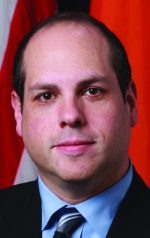
BY LAURENCE P. GOTTLIEB
Sometimes a literal cold bucket of water is exactly what you need to raise awareness for an important cause, but in certain instances a wake-up splash of economic news is sufficient for moving people to take action. That is exactly what the Hudson Valley Economic Development Corp. delivered to nearly 300 business executives and government leaders at the organization”™s State of the Hudson Valley Economic Summit, held in June as part of HVEDC”™s Thought Leaders Master Series.
Global labor expert and Drexel University professor Paul Harrington spoke at SUNY New Paltz on the Hudson Valley”™s economic outlook and current levels of growth.
In his presentation, Harrington characterized the most recent economic downturn as a “blue-collar recession,” as our region lost more than 40,000 jobs during that period ”“ most of them in sectors like manufacturing and construction. While these industries saw large decreases in job availability both regionally and nationally over the last decade, the losses accounted for a staggering 33 percent reduction in the Hudson Valley”™s job market alone between 2003 and 2013.

According to Harrington, the state of New York saw uneven rates of unemployment over the past decade, staying steady from 4.9 percent in 2001 to 4.6 percent in 2007, and then shooting up to 8.5 percent in 2010. It fell once again to 7.6 percent last year. There were months, Harrington noted, in which the state was experiencing up to 900 jobs lost in the height of the downturn.
Those losses were countered by gains in the administration, educational services, social assistance, accommodations, health care and food services sectors, which have seen growth of about 15 to 25 percent each.
Also in his presentation, Harrington said New York has a rate of labor participation significantly smaller than the rest of the country. While, for example, South Dakota sees 70 percent of its labor force engaged in the job market, New York only experiences a labor participation rate of about 61 percent.
Young workers appeared to be the hardest hit and have maintained the highest rates of unemployment in recent years, with the 20-24, 25-29 and 30-34 age brackets seeing rates of 16 percent, 11 percent and 10 percent, respectively, between 2011 and 2012. In addition, although recent college graduates have seen their short-term earning potential reduced, the employment outlook for high school graduates looks even worse.
The good news is the Hudson Valley remains New York”™s fastest-growing region, with promisingly consistent business development and younger workers engaged at a labor participation rate of 35 percent ”“ above the state average.
In his independent analysis of the local job market, Harrington found that while college graduates are now earning more than ever compared to workers with only high school diplomas, older workers are, in general, more valued than younger workers by their employers. They also tend to remain in the job market longer than in years past, a trend that risks shutting out new workers trying to gain a foothold. New workers can squeeze themselves into the job market successfully, however, by working during their high school years, a practice that has been found to not only significantly increase the likelihood of their graduation, but also to earn them higher salaries later.
The author or co-author of 14 books on the economy, Harrington is the former associate director of Northeastern University”™s Center for Labor Market Studies and has studied workforce development and labor resource policy in great depth. He predicts the onset of another recession within the next several years, but characterizes it as being much less severe than the recent downturn because large companies have prepared for it by hedging their investments.
Overall, Harrington characterized the Hudson Valley job market as slowly improving, but improving nonetheless. While a significant proportion of the region”™s growth has been in professional and technical managerial high-level sales, the manufacturing sector shows promising growth as well ”“ although mostly in the area of sales rather than job availability.
At HVEDC, we continue to bring the latest economic data to local business and government leaders in order to help shape the Hudson Valley economy in the coming years. In fact, Harrington”™s presentation coincided with the release of HVEDC”™s first-ever Hudson Valley Business Climate Survey results. According to the report, 77 percent of the 213 businesses surveyed have a neutral to positive view of the business climate in 2015, and half of them predict they will see an increase in hiring in the next year.
With that news, it seems the cold realities of today”™s regional economy will transform into hotter days ahead for Hudson Valley”™s businesses.
Laurence P. Gottlieb is president and CEO of Hudson Valley Economic Development Corp. Contact him by phone at 845-220-2244 or email lgottlieb@hvedc.com.


















